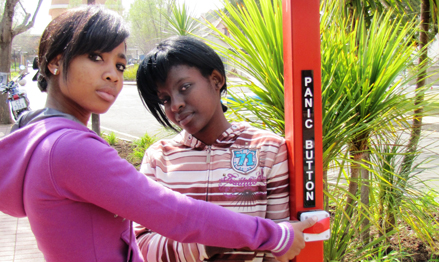Latest News Archive
Please select Category, Year, and then Month to display items
02 January 2025
|
Story Gerda-Marie van Rooyen
|
Photo Supplied
 Leading the research in South Africa is Prof Linus Franke from the Department of Soil, Crop and Climate Sciences.
Leading the research in South Africa is Prof Linus Franke from the Department of Soil, Crop and Climate Sciences.
Scientists are actively pursuing the successful breeding of diploid hybrid potatoes from inbred lines. This is expected to revolutionise potato breeding as it holds the key to rapid genetic progress. It will introduce new varieties for commercialisation through seed. Currently, existing potato variants have a gene that renders self-pollinated seeds infertile.
Prof Linus Franke, an academic in the Department of Soil, Crop and Climate Sciences at the UFS, is leading the research in South Africa. “This technology allows the production of genetically uniform potato seed that is easy to transport and largely disease-free.” He says this differs from conventional breeding whereby only vegetative propagation is possible due to tetraploid varieties in potatoes. It also risks carrying pests and diseases from one generation to the next – leading to the accumulation of pests and diseases with each round of multiplication.
Seed innovation
Prof Franke explains that Solynta BV, a seed company based in the Netherlands that produces potato varieties that can be grown from seed, has included South Africa in their research efforts because it is one of Africa’s largest producers and exporters. Through his academic relationship with Wageningen University and Research, a Dutch institution renowned for its agricultural endeavours and food production, the UFS became involved in researching hybrid potatoes grown from seed.
Diploid seeds containing two sets of chromosomes allow easier gene manipulation to increase predictability and speedier genetic progress. The breeding approach enables the incorporation of tolerance to pests, diseases, abiotic stresses (cold, heat, drought) and other desired genetic traits.
Although Prof Franke is optimistic about this research, he is not blind to disadvantages. “Potato seeds are tiny and have little energy reserves, making it harder to grow potatoes from seed than from tubers.” He says potatoes from seed will take longer to cultivate than tubers, as farmers need to grow plantlets from seeds first, adding six weeks to the growing period. “It is possible that commercial farmers can grow potatoes directly from seed. Alternatively, perhaps more likely, specialised growers will produce tubers of potatoes from seed; these tubers are then sold as seed tubers to other potato farmers, who then continue their normal practices of producing potatoes for the market from tubers.”
Financial benefits
Prof Franke says farmers have reason to get excited. “Seed potatoes will reduce input costs, as varieties with enhanced tolerance to pests and diseases require less pesticides. Planting one hectare of potatoes requires three to four tonnes of potato tubers, but only one 25 g packet of potato seeds.” Since potatoes are a more valuable commodity than maize, this technology might also increase farmers’ income potential.
UFS a much safer place
2011-09-20
|

|
First-year students Chuma Nyiko (left) and Mabasa Teleni next to one of the red poles installed on our Bloemfontein Campus.
Photo: Amanda Tongha |
Students and staff at our Bloemfontein Campus can feel even safer, with several initiatives being put in place to ensure their safety.
The stop-and-search actions of the recent past, which are being carried out at all the main gates of our Bloemfontein Campus, seem to be successful, since car theft has decreased on the campus. Mr Willie Frankim, Head of Protection Services, says the stop-and-search actions are carried out sporadically, but have a definite effect on crime at the campus. Mr Frankim says only one vehicle has been stolen in the past two months as opposed to the many more that have been stolen in the past.
The message that safety is viewed in a serious light reaches as far as our university’s parking areas and walkways, which are being patrolled by security staff. Mr Frankim says a security officer is placed in all the large parking areas, while other personnel are distributed across the entire campus, especially at key areas, such as at the library and student centre.
Our university also recently installed more than 30 red poles across the entire campus. Each of these red poles is fitted with a panic button by means of which help can be summoned. Should a student or staff member feel unsafe, all they have to do is press the button and cameras, which are installed in the vicinity, will focus on the pole and Protection Services will send assistance. Twenty five of these poles are already working and ten more still have to be activated.
Students and staff can also phone Protection Services on 051 401 2911 if they feel uncomfortable about their safety. They can use this number, for example, to ask a security officer to accompany them to their car.